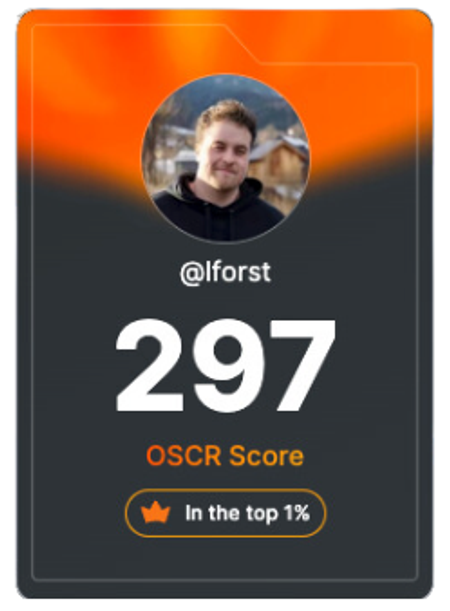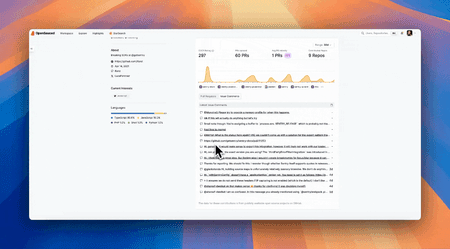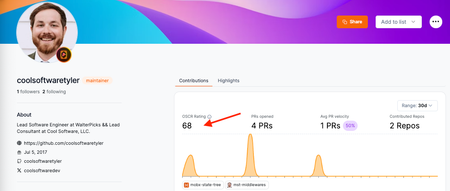
#OSCR
Introducing the OSCR: Celebrating Open Source Stars
BekahHW
6 mins read

In the 1920s, Louis B. Mayer, co-founder of Metro-Goldwyn-Mayer (MGM), envisioned the Academy Awards - also know as the Oscars - as a way to recognize excellence and achievements in Hollywood, and encourage higher standards in the production and presentation of motion pictures. Mayer played a key role in establishing the Academy of Motion Picture Arts and Sciences (AMPAS) and launching the first Academy Awards ceremony on May 16, 1929 at the Hollywood Roosevelt Hotel. It wasn't just a glitzy affair; it was a paradigm shift in how we recognize and value creative work.
Today, open source stands at a similar crossroads. Enter the OSCR - the Open Source Contributor Rating - our attempt at OpenSauced to rethink how we value contributions today.
But let's be clear: OSCR isn't just another vanity metric. It's a provocation to an industry that's often complacent in its approach to recognition. Just as the Oscars shine a light on the best in film, our OSCRs will spotlight the top and upcoming contributors in the open source community.
What is the OSCR?
The OSCR is a rating system that evaluates a contributor's engagement, influence, and impact across the entire open source ecosystem. But it's not just about counting commits or pull requests. The OSCR looks at the quality of contributions, the sway a contributor holds in discussions, and their overall impact on projects.
Calculated on a rolling 90-day basis, OSCR provides a current snapshot of a contributor's involvement and quantifies them based on a total of 300 points. It's not about lifetime achievements; it's about what you're doing now in open source.
You might argue that quantifying contributions could lead to a new form of elitism in open source. You're not entirely wrong. Any system of measurement can be gamed or misused. But the alternative - the status quo of overlooking critical work - is worse. It's driving maintainers to burnout and new contributors away from the community.
Others will say that open source should be about passion, not recognition. To them, I ask: why not both? As I explored in The Need for Recognition in Open Source, recognition isn't just a feel-good factor; it's a fundamental human need. Ignoring this is not just naive; it's detrimental to the health of the open source ecosystem.
The OSCR in Action
Let's be clear: the OSCR is a number, but it's not just a number. It's a conversation starter, a spotlight, and sometimes, a reality check. But here's the thing - behind every OSCR, there's a story. And that story is just as important as the number itself.
Let's pull back the curtain on two contributors with different OSCR scores. But remember, we're not just looking at the score here - we're getting into the complex reality of open source contribution.
High OSCR: The Well-Rounded Contributor (Score: 297/300)
Meet Luca Forst. With an OSCR of 297 out of 300, Luca is an open source powerhouse. But what's the story behind his score?

If we check out Luca's profile we see deep, multifaceted engagement. There's a solid chart of Pull Requests - 60 PRs opened across 9 different repositories in just 30 days. But here's where it gets interesting: Luca isn't just pushing code and walking away.

The abundance of issue comments on Luca's profile shows a contributor who's deeply involved in the development process. He's not just coding in isolation; he's actively participating in discussions, clarifying points for others, and helping to shape the direction of the projects he's involved in.
This combination of quality code contributions and community sway is what pushes Luca's OSCR so high. He's demonstrating that open source isn't just about committing code - it's about committing to the project and its community.
Luca's story reminds us that the highest OSCR scores often belong to those who understand that open source is a collaborative effort. They're not just writing code; they're influencing the development of software through their interactions and engagement.
When I talked to Luca about what made a good open source contribution, he said,
"It's not hard to make meaningful contributions to open source! Contributions don't even have to be in the form of code. A thoughtful consideration for an API change, a bug investigation, or simply a new perspective on a discussion are all super valid and helpful. If you coherently articulate your thought process, you’re contributing to the success of the project."
The Impactful Maintainer (OSCR: 68/300)
Now, let's look at Tyler, a maintainer of mobx-state-tree. With an OSCR of 68, you might assume Tyler's not making a big open source impact. But hold that thought – this is where the story behind the score becomes important.

Tyler's low OSCR doesn't expose some of the behind-the-scenes work happening in the project. As Tyler explains, "We haven't merged a PR for a while, but our internal maintainer discord has been busier this month than the whole year. We even brought on a new maintainer."
This shows a disconnect between public activity and private effort. Tyler's work isn't showing up in commit logs or public discussions, but it's happening in private channels, shaping the future of the project.
There are other factors at play too:
- Project Maturity: mobx-state-tree is a stable, established library. It doesn't need constant updates or changes, which can affect Tyler's OSCR.
- Seasonal Demands: Tyler's day job in the NFL industry means August-October is his busy season, affecting his open source availability.
Tyler's story is a reminder that the OSCR, like any metric, is part of the story. A lower score doesn't always mean less value; it might indicate a shift in focus or responsibilities. It's a call to look at the numbers while understanding the context behind them.
Why OSCR Matters
For too long, we've reduced open source contributions to a game of green squares on GitHub. We've celebrated code commits while ignoring the investment contributors make in projects, the sway they have in conversations, and the quality of their contributions.
The OSCR is more than just a rating system. It's a call to action. It's asking us to reimagine what open source could be if we valued commitment, sway, and quality as much as commits.
We know the current open source system is failing those who give most to the community (see The Lonely Journey of Open Source Maintainers). We want to change that narrative.
Join the OSCR Conversation
Now, we want to hear from you. Your OSCR is more than just a number – it's a story of your open source journey. We invite you to share your OSCR and the story behind it.
- What does your OSCR say about your open source contributions?
- How does it reflect (or not reflect) your experience in open source?
- What has been your most impactful contribution, and how did it shape your journey?
Share your OSCR and your story and tag us so we can continue the conversation about the multifaceted nature of open source contributions and how we can better recognize and value them.
By sharing your story, you're not just talking about yourself – you're contributing to a broader dialogue about recognition in open source and helping shape the future of how we value contributions in our community.
Last Thoughts
The way we recognize and value contributions needs to evolve. The OSCR is our proposal for that evolution, but it's just the beginning.
So, here's our challenge to the open source community: Engage with OSCR. Give us feedback. Tell us how you'd use it or what would make it more valuable to you. Help us refine and improve the system. Use it as a starting point to have the difficult conversations we've been avoiding about value, recognition, and the future of open source.
Because one thing is clear: the status quo isn't working. It's time for open source to have its own Academy Awards moment.

BekahHW
Bekah graduated from a coding bootcamp in May of 2019 and since then has spent time as a frontend developer, started the Virtual Coffee tech community, spent time in DevRel and has continued to mom her four kids. She currently co-hosts the Compressed.fm and Virtual Coffee podcasts, lifts heavy things in her free time, & works as the Developer Experience Lead at OpenSauced.
Recent Posts

bdougie
2 mins read
OpenSauced joins Linux Foundation, making AI-powered open source analytics freely available while expanding beyond GitHub to serve the broader open so...

#kubernetes
John McBride
5 mins read
How the OpenSauced engineering team made a near-zero downtime migration to Microsoft Azure

